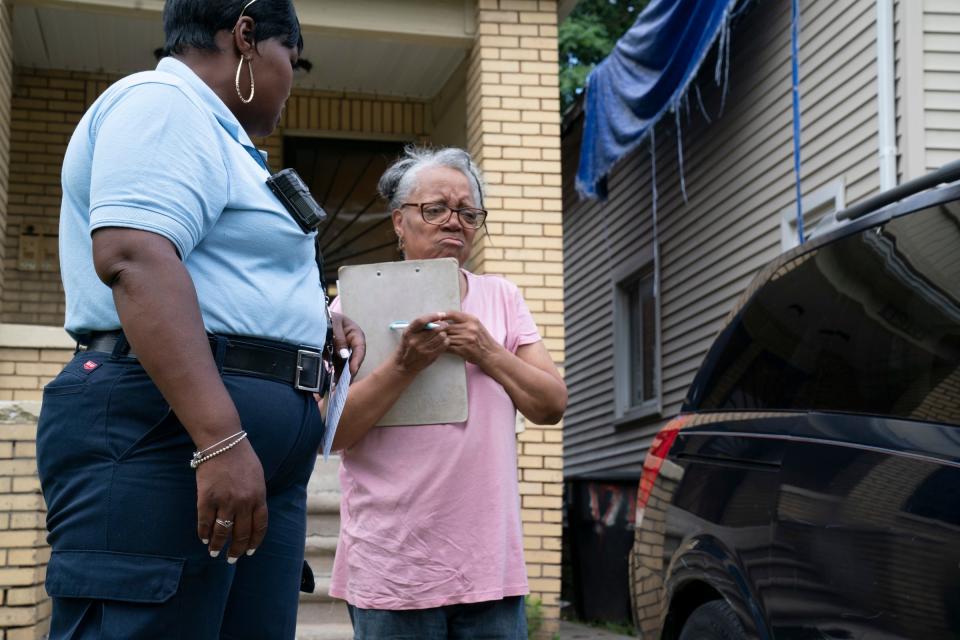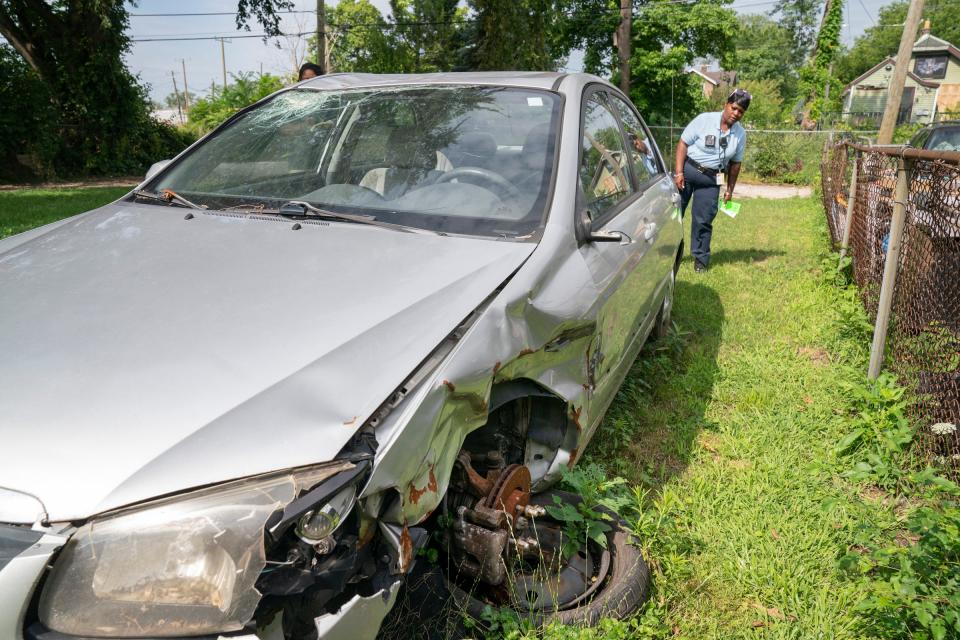Detroit cracks down on abandoned vehicles scattered in residential and public areas
- Oops!Something went wrong.Please try again later.
Detroit is cracking down on abandoned vehicles plaguing neighborhoods with blight, though many residents are unaware of the consequences.
Mayor Mike Duggan earlier this year announced the initiative to remove junk vehicles parked on streets and lawns, which is against city code. Owners are prohibited from parking on unpaved land or letting inoperable vehicles linger on their properties, including those with expired license plates.
The city will issue warnings and can order the vehicles towed. Duggan told the Free Press in May that the Detroit Police Department was addressing at least 80 vehicles a week on private property. That may involve towing or having the owner fix or remove the vehicle.
“This is just classic city of Detroit, where I'm like, ‘Why am I seeing more abandoned cars on the street now?’ ” Duggan said. “Since January, we've been serious. It's going to take till the end of the year to really clean it up.”

Crews go after vehicles parked on lawns or any that are considered abandoned. The city considers vehicles to be abandoned if they sit on a public street for more than 48 hours without moving, said Johnny Thomas, director of code enforcement. If parked on a private property and crews either receive resident tips of violations or witness them, they willl attach a green sticker to the vehicle urging owners to address it within a specific time frame. Sometimes, owners will have 24 hours, but they can request an extension by calling the number on the ticket.
“At that point, it's entered into the (blight enforcement tracking) system and then they're given a hearing date, which is usually two to three weeks from the date on that sticker," Thomas said. "If they move the vehicle prior to that, then they'll cancel. If they do not, the hearing will be held and the hearing officer will find whether or not they moved the vehicle or if they're in violation. If they're in violation, they’ll issue what we call a certificate of compliance. At that point, certificate of compliance is then taken and posted on the vehicle which gives the person that additional 24 hours to move the vehicle. If it's not moved within that 24 hours, then we'll tow it after that.”
As for vehicle owners who may be out of town, Thomas said that as long as the car is registered and in good condition, the city typically won't receive complaints. Action usually stems from calls from neighbors who notice cars that sit for several weeks or more.
Abandoned vehicles often auctioned or scrapped
Once towed, if the vehicle sits for more than seven days, it is sent off to the state, which then notifies the last known registered owner, Thomas added. If the owner does not respond, the state will send the city a notice to auction the vehicle.
"If a vehicle is not purchased, then usually it goes to scrap," Thomas said.
Failing to remove an inoperable vehicle is a $100 fine and can reach up to $500 for multiple offenses. Residents can anonymously report complaints to the Improve Detroit app, powered by SeeClickFix.
During a ride-along with Free Press journalists, code enforcement officers reported to a demolition site off of Dequindre Street and McNichols Road to tow an abandoned trailer surrounded in brush in order for crews to move forward with demolition. As officers waited for the tow truck to arrive, Benta Dixon, a code enforcement specialist, noticed several violations on Marx Street. Dixon has been with the city for seven years and has the role of gently letting residents know of any violations and rules.
Two inoperable vehicles, which she suggested could be scrapped, stood without tires on Debbie Collins’ property off Dequindre and McNichols. Dixon filled out tickets without Collins noticing, but managed to catch her in time, calling it a “win” for the city and resident to have the violations addressed.
Collins, a 69-year-old renter has been living in her home since 2013. She was unaware of the rule, but said Dixon was helpful in explaining some options. Collins said she would immediately call a family member to take the cars to a scrap yard and receive some cash.
“I’ll try to get a scrap person to come and get the cars before the city has to come and get it. If the city has to get it, it's going to be a lot of fees coming out of pocket. She was like, ‘If you can get somebody to come in and get them, you can try to earn something from it as well,’ ” Collins said.

Next door, Dixon found a large damaged truck parked on the lawn, surrounded in brush and serving as a space for cats to sit on tires or sneak underneath. It had an expired license plate, which classified it as inoperable, Dixon said. She knocked on the door, asking the resident, who was hesitant to be seen by Free Press journalists, to move it or face towing, which is enforceable due to it being parked on a Detroit Land Bank Authority property. Moments later, the resident moved the truck, yet another win for both in Dixon’s eyes.
An empty lot sits between two houses. In the house next door is a 71-year-old renter, Cornelia Tyler, who had multiple cars parked in her backyard. Dixon noticed some were either on jack stands or inoperable, including a vehicle with a broken window on the land bank lot. Dixon was also concerned about another vehicle that appeared nonfunctional. But Tyler said she plans to sell its parts.

'On pavement, yes. On grass, no.'
“You’re only allowed one inoperable vehicle at your property, all the tires have to be inflated and it has to be under some type of shed or tarp,” Dixon told Tyler, who asked Dixon, “So we can’t park in our own backyard?”
Dixon gently responded, “as long as it’s on pavement, yes. On grass, no.” Tyler, who has lived in her home as a renter for 21 years, said she parks in the back to avoid vehicle damage from speeding drivers, who have previously hit her daughter's car.
"That's not the first time. My car was out there parked, my car got hit, too," Tyler said. "We have insurance on our vehicles but our insurance goes up every time ... I mean, it's not like we are rich people. You know what I'm saying? We are in a poor neighborhood and we are doing the best we can to survive ... then you have to worry about your car being broken into."
Nakeisha Thompson, 49, noticed the enforcement crews and told the Free Press that neighbors park their cars toward the back to avoid property damage and vehicle theft, an issue her family faced when their car was parked on the street. Thompson said she has not experienced too much trouble on her block, but several streets over, she often notices garbage and blight, which might attract unruly behavior.
"Last year in the wintertime ... I caught a guy on my car. I couldn't get my clothes on fast enough. When I get to the door, I said, 'What are you doing?' And he said, "F you, I've gotta feed my kids,'" Thompson said. "I said, 'That's not my responsibility.' "

"It's horrible," she continued. "Just cause you live in a 'hood, it don't mean you gotta live like you in the 'hood."
Thompson said if residents own their property, they should be allowed to park on their lots, especially since street space is limited.
"Where are all the cars gonna go? They're gonna have to come on the street?" Thompson said.
Stipulations for other motor vehicles
Boats, recreational vehicles and commercial vehicles also have stipulations, and DPD is tasked with towing those, too. None of them can be parked in yards. Residents are allowed to have one registered, recreational vehicle parked at least 3 feet from the rear of the property on pavement.
"If it’s not on pavement, then you'll be issued citations, it will go to court, request a compliance order and once the compliance order is given, we'll come back out. We'll serve you the compliance order, let you know 'hey, you still have X amount of days.' They say 24 hours, but each situation is different," Dixon said. "We want you to come into compliance."
Anyone conducting business with commercial vehicles may park on residential streets, but not on a daily basis because many are either too big or too wide to fit on the street, added Thomas, the code enforcement director.
"Depending on what kind of business you own, like if you own a trucking company, you should have a location to park trucks or if you own a moving company, you should have a location or park your box truck. So that's the issue that they have to put that in part of your business plan. You can’t start a company and just park it. You know you can't have a tow company and then park your tow truck in your driveway," Thomas said.
Dana Afana is the Detroit city hall reporter for the Free Press. Contact: dafana@freepress.com. Follow her: @DanaAfana.
This article originally appeared on Detroit Free Press: Detroit cracks down on abandoned cars

